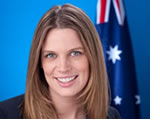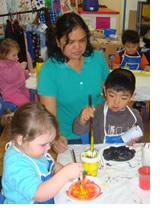| |

Early Childhood and Child Care Ministers Announced
 Prime Minister Julia Gillard has announced her new ministry and responsibility for the early child care sector has now been split between two people.
Prime Minister Julia Gillard has announced her new ministry and responsibility for the early child care sector has now been split between two people.
The Previous Minister for Early Childhood Education and Child Care Kate Ellis retains an important role in the sector as Minister for Employment Participation and Child Care and she is joined by Peter Garrett as Minister for Schools, Early Childhood and Youth.
 It's too early to say what this change will mean for the child care sector right now, however, the Community Child Care Co-operative (NSW) believes that elevation of the early childhood portfolio to a cabinet level position highlights the importance of child related policy areas. It's too early to say what this change will mean for the child care sector right now, however, the Community Child Care Co-operative (NSW) believes that elevation of the early childhood portfolio to a cabinet level position highlights the importance of child related policy areas.
In a statement made following the announcement the Community Child Care Co-operative (NSW) said it's difficult to say what impact splitting the portfolio will have: "On one hand dividing child care and children between two Ministers could be significant, but depending on the break-up of responsibilities, it may not. If Kate Ellis retains responsibility for the National Quality Framework, the separation of child care and education may be of some concern, as could the grouping of child care with workforce participation."
 The Coalition's Shadow Ministry has also been announced and Tony Abbott has appointed Sussan Ley as the Shadow Minister for Child Care and Early Childhood Learning. Ms Ley has also been given the job of Shadow Minister for Workforce Participation. The Coalition's Shadow Ministry has also been announced and Tony Abbott has appointed Sussan Ley as the Shadow Minister for Child Care and Early Childhood Learning. Ms Ley has also been given the job of Shadow Minister for Workforce Participation.
CareforKids.com.au has sought clarification from DEEWR on how these appointments and the division of the portfolio will operate. As soon as we receive a response we'll let you know. In the meantime, tell us your thoughts about the sector's new ministers by visiting CareforKids.com.au/Social.
|

Training Assistance
Up-skilling your team the cost effective way
 A key part of the changes required by the new National Quality Framework are higher qualifications for child care workers.
A key part of the changes required by the new National Quality Framework are higher qualifications for child care workers.
To assist the early childhood sector meet these requirements the Government implemented a range of initiatives back in 2008-2009 which are still available and make training a lot more cost effective.
Removal of TAFE Fees
The Australian Government has provided $115 million (from 2008-09 to 2013-14) to help child care workers gain a qualification by removing the regulated TAFE fees for Diplomas and Advanced Diplomas in Children's Services. This includes existing child care workers looking to upgrade or obtain qualifications as well as prospective new workers to the industry.
For more information click here.
Additional Early Childhood Education University Places
The Government committed $53.9 million to create additional university places for early childhood teachers, starting with 500 new ongoing university places in 2009 and rising to 1,500 new ongoing university places by 2011.
The additional university places will be four year undergraduate degree courses and postgraduate courses, allowing graduates with an existing degree to gain a recognised qualification in early childhood education.
Part time positions are also available enabling child care workers to work while they study.
For general information about the program click here.
Information on the 2011 allocation of university places is available here.
HECS-HELP Benefit for Early Childhood Education Teachers
The Government committed $12.4 million to reduce the Higher Education Loan Program (HELP) debt of early childhood teachers who work in regional and remote areas, Indigenous communities and areas of high disadvantage based on postcode location.
This benefit provides eligible early childhood education teachers with a reduction in their debt of up to $1600 per year (for 2008-09 indexed in later years) up to a maximum of 260 weeks (5 years) of eligible employment.
Eligible teachers should apply for the benefit through the Australian Taxation Office and have up to two years to claim for a particular tax year.
For more information on the benefit click here.
HECS-HELP Benefit for Education Graduates
The Government has also provided funding from 2009-10 to reduce the HELP debt repayments of education graduates. An education graduate is a person who has graduated from a course of study that is required for initial entry to teaching, including early childhood education teaching graduates.
The benefit was available from the 2009-10 tax year and the maximum benefit for that year was $1558.50.
The amount of benefit you receive depends on the number of weeks that you have worked as a teacher and it is possible to receive both the benefits described above if you work in an area of need and graduated in the second half of 2009.
For more information on the benefit for graduates click here.
Remember all of these benefits are currently available so if you trying to determine the best way of dealing with the new qualifications requirements then now might be a good time to explore these options further.
» Read the full article…
|

2010-2011 Child Care Service Handbook
Keep up-to-date with the latest on the child care funding system
 An online version of the new 2010-2011 Child Care Service Handbook is now
available here.
An online version of the new 2010-2011 Child Care Service Handbook is now
available here.
The handbook has been written for all approved child care services operating
under the Child Care Management System.
According to DEEWR it is important to study this new edition because: 'it will
bring you up-to-date and refresh your knowledge of how the Australian
Government child care funding system works, particularly the operation of the
Child Care Management System. It will also help you to understand the 'why' and
'how-to' information.'
Child care services can expect to receive a paper copy of the document shortly.
|

Interview
Alicia Estrella
Director of Kindy4Kids Long Day Care Centre
Penrith, NSW
 Child care professionals share a commitment to improving society by creating dynamic and nurturing care environments for Australia's youngest learners. Child care professionals share a commitment to improving society by creating dynamic and nurturing care environments for Australia's youngest learners.
In this month's Child Care People we speak to Alicia Estrella Director of Kindy4Kids Long Day Care Centre located in Penrith, NSW.
» Read about Alicia…
|
 If you or someone you know deserves to be featured in this section drop us a line at editor@careforkids.com.au. If you or someone you know deserves to be featured in this section drop us a line at editor@careforkids.com.au.
Each child care person we profile will receive a copy of Play School Collection (3 DVD set) for their service.
Courtesy of ABC Kids and Roadshow Entertainment.
|

Brain Dance
What do we know about dance, movement and learning?
 How dance and movement help children experience their world. How dance and movement help children experience their world.
Research tells us that in children from birth to age six a lot of important learning happens and neural connections are made at a very fast rate.
During this early learning period, children show us the many ways that they naturally and competently explore their world and approach learning. They hear, taste, see, move through and feel their world. As Einstein shared, "Learning is Experience" and early educators should pay attention to these natural learning experiences.
One important way children explore and learn about their world is through physical movement. Movement is a way for children to express themselves, particularly if they have not yet developed verbal language. As educators, we need to not only support movement as a learning tool, but embrace it.
» Read the full article…
|

Safe Sleeping Practices
The most important points to remember
 A recent study by the American Academy of Pediatrics has shown that 20 per cent of SIDS deaths in America occur in child care settings.
A recent study by the American Academy of Pediatrics has shown that 20 per cent of SIDS deaths in America occur in child care settings.
The same study says that based on the time infants spend in care only 9 per cent of deaths should occur in child care services.
SIDS remains one of the leading causes of death for infants from one month to one year of age and sleeping infants and young children safely is a significant responsibility for those who care for other people's children.
It is vitally important for child care workers to ensure that children in their care are safe at all times and that service policies and procedures reflect evidence based research.
In addition, child care services are required to stay up-to-date with their safe sleeping policies in order to maintain accreditation with the NCAC.
According to SIDS and Kids the most important points for child care services to remember for safe sleeping are:
» Read the full article…
|

Featured posts
CareforKids Social
 A different approach
A different approach
Benefits of LDC & FDC
Children deserve to be successful and happy at school
Latest Events |

Got Some Time Out…
Catch up on back issues of Child Care News
 September 2010
September 2010
August 2010
July 2010
June 2010
May 2010
April 2010
March 2010
February 2010
December 2009
November 2009
October 2009
|
|
|
|
|